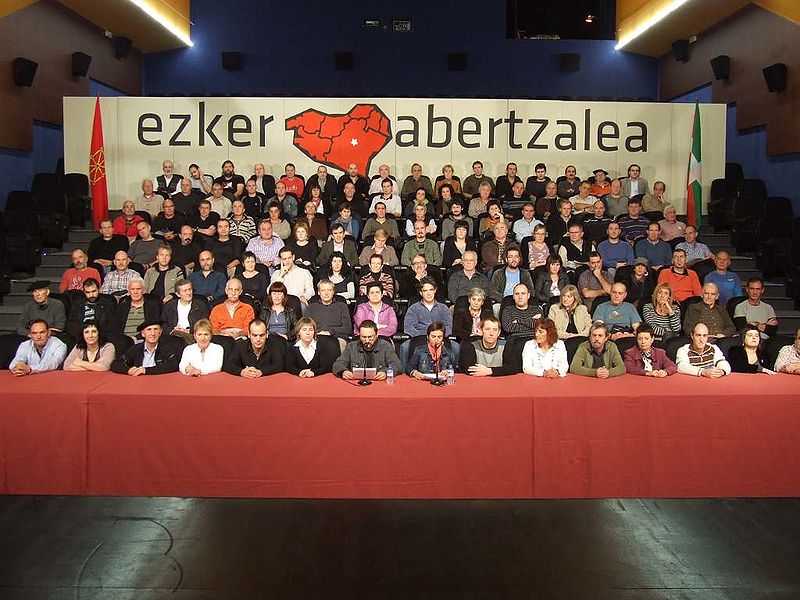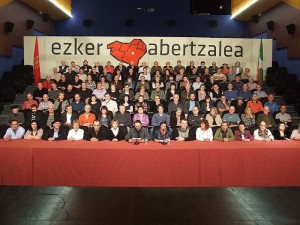
Is Peace in the Near Future?
 In 2009 the Abertzale Left’s announcement of their unilateral decision for peace in what is considered Europe’s longest war was a major turning point for the Basque people. [i] A domino effect began as terrorist group, Euskadi ta Askatasuna (ETA), declared a ceasefire on 20 October 2011. The Aiete Declaration (October 2011), Civil Society Forum (March 2013), ETA’s definitive ceasefire, and the Brussel’s Declaration (March 2010) have recently set the scene for the success of peace throughout the Basque Region. The international community’s support makes this reconciliation process obtainable in the near future. The only piece of this puzzle that remains absent is the involvement of the French and Spanish governments in the peace discussions of this post-conflict region.
In 2009 the Abertzale Left’s announcement of their unilateral decision for peace in what is considered Europe’s longest war was a major turning point for the Basque people. [i] A domino effect began as terrorist group, Euskadi ta Askatasuna (ETA), declared a ceasefire on 20 October 2011. The Aiete Declaration (October 2011), Civil Society Forum (March 2013), ETA’s definitive ceasefire, and the Brussel’s Declaration (March 2010) have recently set the scene for the success of peace throughout the Basque Region. The international community’s support makes this reconciliation process obtainable in the near future. The only piece of this puzzle that remains absent is the involvement of the French and Spanish governments in the peace discussions of this post-conflict region.
The Basque’s Progress
The Civil Society Forum was created in March 2013.[ii] The absence of a dialogue between the Basque people, Spanish government, and French government ignited the creation of this unilateral Basque Forum. The forum includes diverse individuals from the Basque Region of all different specialties. The organization “was created by Lokarri, Red ciudadana por la paz (Citizens’ Network for Peace), Bake Bidea (a peace organization in the French Basque Country), Ahotsak (a network of political women who work on the peace process), and groups of young people of all ideologies”. [iii] This diversity allows for more creativity when it comes to keeping peace in the Basque Region and continuing the nonviolent fight for the Basque culture. This forum has worked on topics such as ETA’s prisoner policies, ETA’s disarmament, and using tools such as negotiations instead of violence to resolve issues between these people, while still promoting an adequate amount of nationalism. The Basque people have put an emphasis on empowering the citizens to work towards their goals of autonomy in a peaceful manner, as well as keeping the pressure on ETA to remain loyal to their ceasefire. Basque nationalist’s peaceful protests before events such as the trial for the thirty-five accused separatists have set the stage for peace in this post-conflict area.[iv]
ONE Big Global Community
Humanity’s evolution has brought us away from the Hobbesian mentality of all-out war against all but one’s own entity. Instead, the growing interdependence of the global economies and the environment force individual states, nations, groups, and individuals to work together for the good of all people. The Basque’s Civil Society Forum, Brussels Declaration, Declaration of Aiete, and PODEMOS movement give hope to the possibility of world peace. 5[v] The youth around the world is becoming more involved in working towards this peace and reconciliation of post-conflict areas. It is imperative that this drive continues and grows stronger in the upcoming years. Peace in the near future would mean less violence and more progression for the adolescence. Today’s modern technological advances have increased the severity of war, thus making this transition imperative.
It Only Takes ONE
“We Can” says Pablo Iglesias in his left-wing political party, PODEMOS that was recently formed in March of 2014. Only thirty-six years old, Iglesias has created a powerful movement of a need for peace in a democratic state and has inspired civil empowerment throughout the Iberian Peninsula. His youth has encouraged many others of all ages to reach out and do more for the community. It proves to the people of Spain that change is possible. The common individual needs to take initiative and act, just as those in the Basque community have in movements such as their Civil Society Forum.
The Next Steps?
Individuals need to take responsibility for their fellow neighbors to assure the fair treatment of all people is carried out. Organizations such as the Basque Agency for Gender Equality are on the right path towards this goal of reconciliation and fair treatment of all people. [vi] The root of the issue lies beneath the long history of struggle in the Basque region. The legacy of violence has been influenced by the Spanish Civil War, Franco regime, and the resulting formation of ETA. Because of this, the reconciliation process must begin with an open mind and putting an end to the conflict system mentality that pins people against each other. Both sides of the issue need to be addressed. When both sides of a conflict are taken into consideration, a fair compromise can be met. Continuing to put pressure on the Spanish and French governments to involve themselves in the reconciliation process is vital. A change begins with the individual. As Pablo Iglesias has shown, one person can make a great difference. It is when these people are united together that change will result.
[i] Political parties that support Basque independence and a range of ideologies from communism to social democracy
[ii] “Introduction [to Basque Peace Process].” Basque Peace Process. N.p., n.d. Web.
[iii] Rios, Paul. “Basque Country Experiences of the Social Forum to Invigorate Peace.” (n.d.): n. pag. Conciliation Resources. Web.
[iv] Boutreux, Laurence. “35 Basque Separatists Go on Trial in Spain.” N.p., 3 Dec. 2015. Web.
[v] “Brussel Declaration, Statement by International Leaders in Conflict Resolution and Peace Processes | Basque Peace Process.” Basque Peace Process. N.p., n.d. Web. 08 Dec. 2015.
“Proposals | Basque Peace Process.” Basque Peace Process. N.p., n.d. Web. 08 Dec. 2015. <http://www.basquepeaceprocess.info/proposals/>.
“What Is Podemos?” Podemos London Circle. N.p., 12 Apr. 2014. Web. 08 Dec. 2015.
[vi] Potter, Michael. “Emakunde: The Gender Equality Institution in the Basque Country.” Emakunde: The Gender Equality Institution in the Basque Country (n.d.): n. pag. Web.
